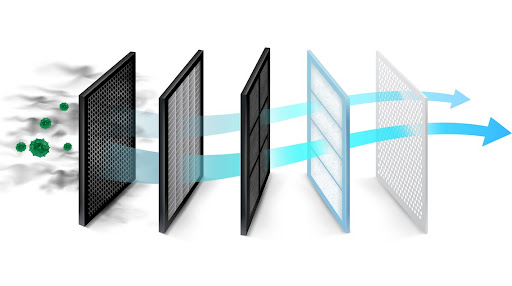
Everyone has heard that air filters need to be changed regularly, but what’s the big deal? Is it really that important to make sure filters stay clean? Dirty filters not only reduce the efficiency of the HVAC system and waste energy, they can also pose potential health risks to the facility’s occupants. Keeping filters clean is essential to keeping people safe.
What’s in the Air?
Air carries pollutants in it from a variety of sources. Depending on whether the air is recirculated from other parts of the facility, or fresh air coming from outside, will determine the type and concentration of pollutants it carries. Some of the major pollutants in air are:
- Pet Dander
- Dust
- Pollen
- Volatile Organic Compounds (VOC’s)
Usually, these pollutants are just a nuisance. However, prolonged exposure can make people sick. Even when people are not getting sick, poor air quality can lead to poor productivity. A Harvard study showed that by improving the amount of ventilation in an office space (40 cfm/person instead of 20 cfm/person) the typical office worker’s productivity went up by $6,500 per year. People can work better when the air they breathe is cleaner.
Why Are Dirty Filters So Bad?
Dirty air filters reduce the quality of the air that a facility’s occupants breathe. Sometimes the effects are mild, such as irritating allergies. Chronic exposure to poor air can lead to more serious problems like chronic obstructive pulmonary disease (COPD). Filters help to remove these contaminants from the air, but will struggle when they reach their capacity. Swapping dirty filters for clean ones keeps the system operating as it should.
Related: Why IAQ Is Important When Returning to Work
Wet filters can also be very dangerous to occupants. Filters tend to collect particulates like mold spores, which is typically a good thing. By capturing these spores, the filters prevent them from being spread through the ductwork and into other areas of the facility. If the filters get wet, however, the mold spores can begin to grow and the filters can fail. Exposing occupants to mold can lead to infections in the lungs and other body parts. Steps should always be taken to prevent mold growth on filters.
How Can I Improve My Facility’s Air Quality?
Changing air filters regularly, especially by putting them on a preventative maintenance schedule, is a quick and easy way to improve your facility’s indoor air quality. If your facility wants to further improve the air quality, there are two main methods that should be looked at: increasing filter efficiency or changing the method of filtration.
Filter Efficiency
Not all filters are created equal. In fact, filters receive a MERV rating, which indicates how well the filter can remove particulates from the air. The higher the MERV rating, the more effective the filter. Most filters are at least a MERV 8 rating. Choosing a filter with a higher rating, such as a MERV 11 or MERV 13 filter, will increase the amount of pollutants the filter can pull out of the air.
The downside of increasing a filter’s MERV rating is that it means the system will have to work harder to pull air through the filter. Increasing the filter’s MERV rating may require more frequent filter changes, or an increase to the fan motor in the HVAC system.
Related: Do You Know How to Clean Air Filters?
Filtration Methods
In addition to the standard panel filters almost every HVAC system has, additional technologies exist to remove even more particulates from the air. Some of the most popular technologies are:
- UVC Lighting
- Photocatalytic Oxidation (PCO)
- Ozone
These three types of device work in different ways to remove particulates from the airflow. Plenty of articles are written on the details of how these technologies work, but essentially, UVC lighting kills bacteria and viruses with light similar to the sun's rays. PCO works by adding an electric charge to the particles, causing them to clump together so a MERV filter can more easily catch them. Ozone uses oxygen molecules to “attack” viruses and other compounds to hopefully render them inert. However, please note that ozone can also lead to poor health outcomes when in high concentrations, so it is generally only used in select applications.
Although air filters and indoor air quality can be easy to overlook, their importance in your facility cannot be overstated. Clean filters keep people safe and healthy. For other ways to improve the health and productivity of your facility, contact Tate today.
